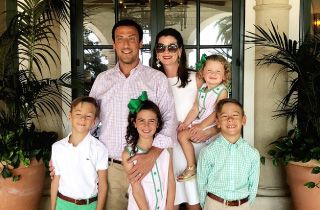Knowledge is Power for Isaac Lidsky
June 1, 2019
For Isaac Lidsky, it’s not about the blindness; it’s about the vision. When Isaac began to lose his sight from retinitis pigmentosa (RP) at the age of 12, he had no way of knowing that his sight loss would end up being his greatest motivator.

Isaac was clinically diagnosed with his inherited retinal disease (IRD) when he was 13. In the years that followed, his family became active, enthusiastic supporters of research. “It was a big deal for my family and me,” Isaac says of the efforts to discover the genetic mutation — DHDDS —that caused his blindness. “From the moment of my family’s diagnosis, we craved information. What was the cause of genetic sight loss in our family?” The Lidskys built a strong relationship with Bascom Palmer Eye Institute at the University of Miami, where Isaac was tested. “We spent a lot of years and a lot of time with remarkable people fundraising to support the scientists who were trying to answer that question.”
From the moment of my family’s diagnosis, we craved information. What was the cause of genetic sight loss in our family?”
In some ways, Isaac felt like he was up against a clock, with limited time before he would lose his vision. Leading the fulfilling life he felt blessed to have required a perspective shift. That motivation led Isaac to an accelerated graduation from Harvard College. He later graduated magna cum laude from Harvard Law School. That was only the beginning of his impressive list of successes to date.
Isaac rejects ideas of limitation, focusing instead on gratitude for the blessings he has received. His list of accomplishments is diverse for someone still so young: he was a child television star, co-founded an internet startup, argued appeals in federal court as a U.S. Justice Department lawyer without a single defeat, and was a two-time U.S. Supreme Court clerk.
These days, Isaac runs two businesses—a construction services company in Florida and a blockchain technology company in New York that is building enabling architecture for the digital marketing industry. He is happily married with four children – all four of whom have been genetically tested. This decision was something Isaac and his wife Dorothy thought about a great deal. “As parents, you worry for your kids and want the best for them,” said Isaac. “And for me as their blind father, in the back of my mind I had wondered if part of my parenting of my children would involve passing on to them, in more direct ways, my experiences of sight loss.” He and Dorothy decided to have their children genetically tested for Isaac’s disease.
Deciding to arm yourself with this valuable information requires a lot of “soul searching,” according to Isaac, because the results could impact how you parent your children moving forward. Isaac and Dorothy wanted to be prepared in either situation; if one or more of their children were diagnosed with RP, they would have been equipped to parent them appropriately. Blessedly, none of Isaac’s children inherited his IRD, but the process reaffirmed that knowledge is power.
In addition to his emotional interest in genetic testing, Isaac urges families to take the next step in this process for practical reasons: “The key to making any progress on solving disease is first understanding.” Thinking back to the time before he was genetically tested and then after receiving his official genetic diagnosis, Isaac said that it all became a lot more concrete and practical. Genetic testing allows those with an IRD to approach current and future vision loss research with a more informed perspective. Support for genetic testing naturally accompanies support for the scientific community’s development of treatments and breakthroughs for these genetic conditions. “So much of medicine begins with being a proactive, informed advocate for yourself,” Isaac says, and it’s important to find a doctor who will do the same for you.
Isaac’s IRD has given him increased awareness and accountability. The title of his book encapsulates his lease on life: Eyes Wide Open: Overcoming Obstacles and Recognizing Opportunities in a World That Can’t See Clearly. Isaac also asks questions about a less literal vision in his TED Talk, “What reality are you creating for yourself?” He encourages anyone who might take something in his or her life for granted to view their world differently, and the message resonates with and motivates all audiences. Isaac’s empowering approach to living and leading continues to impact many.
Isaac still hopes for scientific progress and says that while he would not change any part of his life and the experiences he has had, he would “happily get sight back” if it meant he could see his kids. In the meantime, he has found peace of mind knowing that he and Dorothy have done everything they can to raise their children in the spirit of preparation and, above all else, with grateful hearts.
Sign up to find out when we add new stories to the site.
